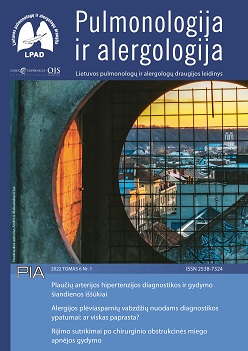INFLUENCE OF VARIOUS FACTORS ON SPUTUM CULTURE CONVERSION IN THE TREATMENT OF MULTIDRUG–RESISTANT TUBERCULOSIS
Abstract
Introduction. It is still unclear what factors may influence sputum culture conversion in the treatment of multidrugresistant tuberculosis (MDR–TB). Also, there is still no single accepted biomarker that could be used to predict tuberculosis (TB) treatment results at an early stage of the treatment. Aim of the study. To evaluate the influence of various factors on sputum culture conversion during treatment of MDR–TB. Methods. A prospective, two–year study with MDR–TB patients who were diagnosed with TB for the first time in their lifetime. Concentrations of possible TB biomarkers (C–reactive protein (CRB), soluble intercellular adhesion molecule – 1 (sICAM–1), soluble urokinase-type plasminogen activator receptor (suPAR)), non–specific T lymphocyte subpopulations in the peripheral blood and social factors of the TB patients were evaluated. Results. The risk of sputum culture non–conversion after the first month of MDR–TB treatment was 48–fold higher in alcohol users. The influence of other social factors, biomarker concentrations, and non–specific T lymphocyte subpopulations on sputum culture conversion was not observed. Conclusions. Alcohol consumption is a major risk factor for sputum culture non–conversion in MDR–TB patients.


